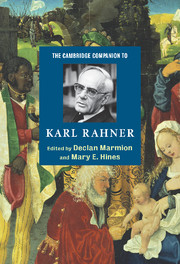Book contents
- Frontmatter
- Introduction
- Part I Spiritual, Philosophical, and Theological Roots
- Part II Theological Investigations
- Part III Conversations Ongoing
- 12 Rahner amid modernity and post-modernity
- 13 Rahner’s reception in twentieth century Protestant theology
- 14 Karl Rahner
- 15 Rahner and religious diversity
- 16 Political and liberation theologies
- 17 Feminist theologies
- Part IV Retrospect and Prospect
- Appendix
- Index
16 - Political and liberation theologies
from Part III - Conversations Ongoing
Published online by Cambridge University Press: 28 May 2006
- Frontmatter
- Introduction
- Part I Spiritual, Philosophical, and Theological Roots
- Part II Theological Investigations
- Part III Conversations Ongoing
- 12 Rahner amid modernity and post-modernity
- 13 Rahner’s reception in twentieth century Protestant theology
- 14 Karl Rahner
- 15 Rahner and religious diversity
- 16 Political and liberation theologies
- 17 Feminist theologies
- Part IV Retrospect and Prospect
- Appendix
- Index
Summary
There is a wide consensus among theologians that Rahner was a turning point in Catholic theology, paving the way for a fruitful dialogue between modernity and Catholic theology and opening countless doors to further theological enterprises. A very fruitful Rahnerian heritage can be found in the work of two theologians who have developed their own theological projects in two different cultural and social contexts: Johann Baptist Metz in Germany, and Gustavo Gutiérrez in Peru. Political theology has developed in Germany through the works of Dorothee Sölle, Jürgen Moltmann, and Johann Baptist Metz. Of the three, Metz is the key figure to capture some of the potentialities and problems in the theology of Rahner, of whom Metz was a student, a collaborator, and a friend. Liberation theology is a way of doing theology that originated in Latin America in the late sixties and is currently widespread throughout the world. Gustavo Gutiérrez is widely regarded as the father of that theology, since he has been one of its most consistent proponents, and the first who formulated it formally.
Gutiérrez and Metz, as well as the theological currents they represent, relate to Rahner in a different way. Whereas Metz studied under Rahner, Gutiérrez’s main exposure was to la nouvelle théologie during his studies at Lyon. However, Rahner’s theology plays the role of starting or referential point in both political and liberation theologies, which, therefore, present continuities and discontinuities in relation to Rahner. Among the continuities, these post-Rahnerian theologies seek the meaning of faith and the role of theology in relation to the situation from which they stem and to which they relate, thus following the Rahnerian drive toward a pastorally focused theology that is meaningful to those Christians who want to live out their faith in the midst of their culture. In that sense, they are pastoral correlational theologies.
- Type
- Chapter
- Information
- The Cambridge Companion to Karl Rahner , pp. 249 - 263Publisher: Cambridge University PressPrint publication year: 2005

